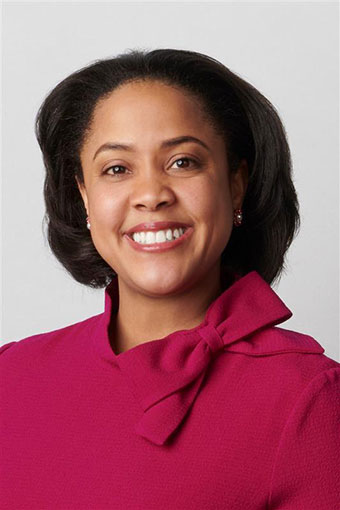It is a Pleasure to Introduce, Shannon Wilson, Vice President, Population Health & Health Equity for Priority Health & Executive Director of the Priority Health Total Health Foundation
 Q: You started your career as an epidemiologist. How did that set you on a path to advocating for health equity as your career progressed?
Q: You started your career as an epidemiologist. How did that set you on a path to advocating for health equity as your career progressed?
SW: When I was in high school, I heard a statistic that African American women were much more likely to contract a sexually transmitted disease in their lifetime. That seemed strange and unfair because they’re not any more promiscuous than other populations. I first wanted to be an ob/gyn and then learned about epidemiology, the study of medicine which deals with the incidence, distribution and possible control of diseases and other factors relating to health. I knew then that I wanted to work toward health equity among vulnerable populations. So, over the course of my career I have taken positions that have given me the opportunity to ensure that I’m working on population disparities.
Q: What did you discover about health care disparity in the state of Michigan?
SW: I think wherever you look in Michigan, whether rural or urban, we know that our historically marginalized populations do not fare as well. African, middle eastern, Latinx, and native Americans are all disproportionately impacted by negative health outcomes. We need to look at that and adjust the factors leading to those outcomes, many of which are rooted in racism. And this doesn’t mean calling someone racist, but instead that policies are rooted in historical racism such as education. If you live in a certain zip code your child is going to go to a better school. And the statistics bear out that with more education and more money there are better health outcomes. It’s not intentional or overt, but the roots of historical racism built into our communities.
Q: Later you served as the Executive Director for the Grand Rapids African American Health Institute. Talk about the grassroots level work you did at that time.
SW: Grassroots level work is fun. The piece I love the most is interacting with a community. I like to find out at the root what they need or want from healthcare or a health system. Instead of sitting in our offices and trying to determine the needs and problems in a community, the Grand Rapids African American Health Institute served as the bridge between the people and health care. We had our ear on the ground so we could listen to what the community needed in order to stay focused and grounded with what we were trying to do.
Q: You’ve played a critical role in Priority Health’s data driven Social Determinants of Health program. Tell us about it and how it can conquer health disparities and improve health outcomes for all.
SW: By relying on data to better understand our community, we can make more informed decisions to drive direct connection with members and implement new programs or community investments that will have a meaningful impact. The important role of social determinants is coming into focus and there are many noble initiatives aiming to address them. But taking a purposeful, data-driven approach to implementing the right programs in the right place, and then measuring their impact, takes addressing SDoH to the next level.
Q: You are also the executive director for the Priority Health Total Health Foundation which awards grants specifically to nonprofits in Southeast Michigan. What goal do you have in mind when you are choosing grant recipients?
SW: We are committed to helping improve the health and well-being of the people of Detroit and the most effective way to do that is by investing in organizations that are making a difference and successfully transforming lives. One of our grant recipients is Metro-Detroit Black Business Alliance. This organization seeks to help close the racial wealth gap through the lens of Black entrepreneurship. Another recipient, Emmanuel House, serves as a 24-hour emergency shelter for women and children who are victims of domestic violence in Detroit. A third is Ice Skating in Detroit, a program designed specifically for school age, urban girls of color who otherwise would not have the opportunity to participate or perform in this sport. Along with mentoring and academic support these young women build confidence and skill that will launch them into greater future endeavors.
We are continually looking for organizations that are addressing equity in the social determinants of health.
Q: What is a critical component in ensuring health equity for all and how does the work you’re doing address that?
SW: It’s important to understand that every individual’s life experiences and needs are different. At Priority Health, we take a look at the whole person and use data to see which social factors are most critical for our members. That data informs our decisions regarding programs, sponsorships, and services in order to ensure that every resident in Michigan has equal access to health and well-being.
Q: What drives your passion and commitment to give back to the city of Detroit?
SW: First of all, I love Detroit and the spirit of Detroiters. Detroit is the blackest city in America and faces complex issues that we need to overcome, therefore I think it is the perfect place get it figured out. While so many people look at Detroit as a problem, I see it as an opportunity to take advantage of this unique position. I get excited about where Detroit is going and all the people who are collaborating and aligning efforts to get the city to its fullest potential. I want to be a part of this special work to see the disparities reduced and equity achieved for all Detroiters.
Q: What is one word of advice you can offer to young women who want to reach your level of success?
SW: Rise above problems and move forward. I have found throughout my career to not let setbacks hold me back. Instead, be resilient and use setbacks to gain momentum to reach your next level of greatness.
Q: Which woman inspires you and why?
SW: Melody Hobson, president and co-CEO of Ariel Investments and chairwoman of Starbucks, inspires me because she’s at the top of her game in every category, yet she still makes space to be authentically herself, authentically black, and authentically feminine. Married to director George Lucas, she negotiated the acquisition of DreamWorks Animation by NBC Universal as well as responding to a racial incident at Starbucks by shutting down all Starbucks locations for a day and a half to do racial training. She has shown up and brings every bit of herself to her job.
Q: What advice would you give to young women who want to succeed in the workplace?
SW: Find a mentor or a sponsor. It’s important not to go it alone. I think the perspective and wisdom you get from mentors and the opportunities sponsors provide are an absolute necessity to advance in the workplace.
Q: Can you tell us how you manage your work life balance?
SW: I cut off at five o’clock and have been strict about that this year. I’m intentional about making sure my family gets dedicated time and I take my kids to school every morning. Once a month I do something with each daughter by themselves and my husband and I also schedule a date night. I’m getting better about self-care and now once a quarter I take a vacation day to go the spa or get my nails done or do something that I enjoy.
Q: At the start of your career what do you wish you had known?
SW: Career progression is not linear. I thought it would be a straight path, but you may loop several times until you learn. You may deviate on the path and the destination may change, but all that matters is that you continue to grow and get better.
Five Things About Shannon Wilson
1. What celebrity would you like to meet at Starbucks for a cup of coffee?
I would love to go to Starbucks with Michelle Obama. Not only do I think she’s fantastic, but I also would love to know what her years in the White House were like. I would ask her what it was like being the first black person to live in the White House. How did she handle the pressure and expectation that comes with that?
2. Who is the most fascinating person you’ve ever met?
I was able to get to know the late Chadwick Boseman who played the Black Panther in the Marvel Cinematic Universe from 2016 to 2019. He was my cousin’s best friend and I found him to have such a humble spirit.
3. Best and worst flavor ice cream?
I love salted caramel from Graeter’s Ice Cream based in Cincinnati, Ohio. My worst would be anything with peanut butter or peanuts.
4. Are you a morning person or a night owl?
I am a morning person which could be considered someone else’s night as sometimes I get up at 4 a.m. Usually it is a little later than that and I spend time in quiet meditation and prayer and then help my kids get ready, and we’re out the door by 7 a.m.
5. Favorite Dessert?
My favorite dessert is bread pudding, but it has to be real Louisiana bread pudding. Actually, I love all food from New Orleans, but with bread pudding it’s sweet it’s bread—it’s delicious. I can make my own, but I haven’t perfected it yet.

